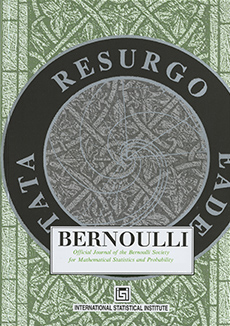Abstract
The effect of measurement errors in discriminant analysis is investigated. Given observations $Z=X+\varepsilon$, where $\varepsilon$ denotes a random noise, the goal is to predict the density of $X$ among two possible candidates $f$ and $g$. We suppose that we have at our disposal two learning samples. The aim is to approach the best possible decision rule $G^{\star}$ defined as a minimizer of the Bayes risk.
In the free-noise case ($\varepsilon=0$), minimax fast rates of convergence are well-known under the margin assumption in discriminant analysis (see (Ann. Statist. 27 (1999) 1808–1829)) or in the more general classification framework (see (Ann. Statist. 35 (2002) 608–633, Ann. Statist. 32 (2004) 135–166)). In this paper, we intend to establish similar results in the noisy case, that is, when dealing with errors in variables. We prove minimax lower bounds for this problem and explain how can these rates be attained, using in particular an Empirical Risk Minimizer (ERM) method based on deconvolution kernel estimators.
Citation
Sébastien Loustau. Clément Marteau. "Minimax fast rates for discriminant analysis with errors in variables." Bernoulli 21 (1) 176 - 208, February 2015. https://doi.org/10.3150/13-BEJ564
Information





